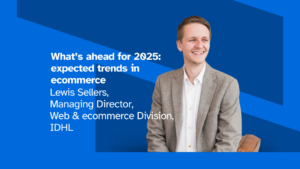By Lucie Buisson, Chief Product Officer, Contentsquare
In a world of ever increasing data, consumers and media alike are becoming more aware of the benefits and the risks, causing a global shift to adopting a privacy-first mentality. Providing a sense of security and safety goes a long way to building digital trust, and the removal of cookies is a huge step in the right direction. In my eight years at Contentsquare, we have always been obsessed with helping brands prioritise behavioural data to create relevant, rewarding digital experiences, and it’s become more and more clear that the future of human digital experience means less intrusive data for better experiences.
Now is the time to be ahead of the curve. Customers want more control of their data, so we as marketers need to be listening to them without tracking who they are. If we’re tracking anything, let’s track their digital body language.
As we all know, in 2020 Google announced its intention to leave third-party cookies for good in favour of a privacy-first future. While this move was generally met with a positive reception from the public, some marketers were a little concerned. Still, after years of negative press surrounding Google’s tracking and cookie policies, the company was finally starting to look at privacy as a priority.
However, it’s one thing promising sweeping changes, and it’s another to deliver on them.
People want to see urgency — a clear indication of Google’s willingness to put privacy first. Yet the delays surrounding the cookie cull gives many the opposite impression. While some marketers have viewed the 2021 decision to delay the ‘Privacy Sandbox’ until 2023 as some well needed respite, public opinion is beginning to sway. Privacy is vital and the consensus is that if organisations aren’t with the consumer, they are against them.
Apple is leading the way but marketers shouldn’t be waiting for the giants of technology to usher in a new privacy-first era. The cookieless future is inevitable and it is better for organisations, marketers and consumers alike if it is welcomed with open arms.
A privacy-first future
Data protection and security are now at the forefront of the modern consumer’s mind, and regulations are constantly evolving. A side effect of this regulation is an increased awareness among consumers of their data-privacy rights and protections. It is vital that companies focus on ensuring they offer transparency about how their customers’ data is used. People want to know what information is being collected and who it is shared with, but most of all they want control.
Apple is a great example. The tech giant recently unveiled iOS 15 updates, which made it both easier and more visible for users to track and control who is collecting their data, overall raising customer awareness with the new version. The results? Millions of users began to realise just how much they were being tracked. The update has been positively received, with many users finding the privacy measures commendable — despite having previously collected customer data for over a decade without such protections. However, the key takeaway is the same: if Apple is shouting about it, it must be important, and marketers should follow suit.
The real question is whether or not privacy needs and aspirations will cause marketers and product leaders to create non-invasive human digital experiences. Can you create great customer experiences without the personal layer of information? Consumers want their privacy, but still want a high level of personalisation and tailored digital experiences. It’s up to us to balance those two needs.
It’s clear: cookieless solutions are out there, and marketers need to reach out and grab them now.
Cookieless solutions
At the moment, it is completely unknown when marketers will be able to test out Google’s cookieless systems. There’s only one solution to overcome the next two years of uncertainty — allow consumers to be in control of their data, their experiences, and of the relationship they have with brands. They should be the ones dictating how they engage, what they share, and how it’s used (or not used).
Marketers have an opportunity to shift their strategies to complement what consumers communicate to them, taking the idea of an ‘opt-out’ function to the next level. Now, consumers can decide details such as how often, when, about what, which channel, and more for brand communications. Ultimately, this serves brands, because they understand individuals better, can do that at scale, and there are no generic customer profiles or experiences. Everything is curated, which is very insightful to the brand but it is also exactly what the customer wants.
The key is to make sure brands know what their users want and how they feel about their digital experience. This is relationship building at its core, the other pillar of the privacy-first future. Without cookies, account logins will become vitally important when keeping track of individual customers and their preferences. Encouraging users to sign up to sites not only helps build a relationship and encourages loyalty, but enables analytics software to bring together more well-rounded customer profiles.
Having this level of understanding into customers enables brands to deliver excellent and personalised experiences without the need for cookies.
Actions for Marketers
In order to successfully achieve a privacy-first future, brands need to adopt cookieless solutions now. At the same time, marketing technologies need to start planning for cookieless alternatives to their products.
According to recent research, only 37% of businesses consider themselves to be ‘very prepared’ for the cookieless future. With two thirds of organisations still lagging behind the curve it’s vital that they futureproof their analytics software and start placing digital trust at the heart of the customer experience.
Marketers don’t need to know who their customers are to help them, to offer them more human digital experience, but what they do need is to understand what they need, what they want, and what they are trying to achieve. For this, marketers do not need personal data and can focus on their digital body language and behaviours. Privacy is an essential part of any digital experience, and the onus is on us as marketers to address it now.








